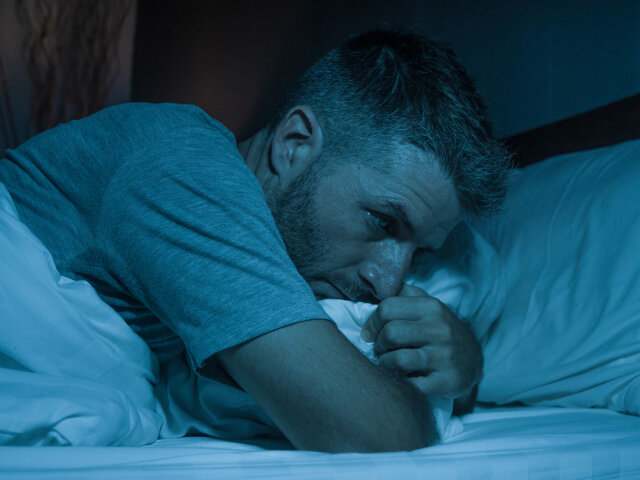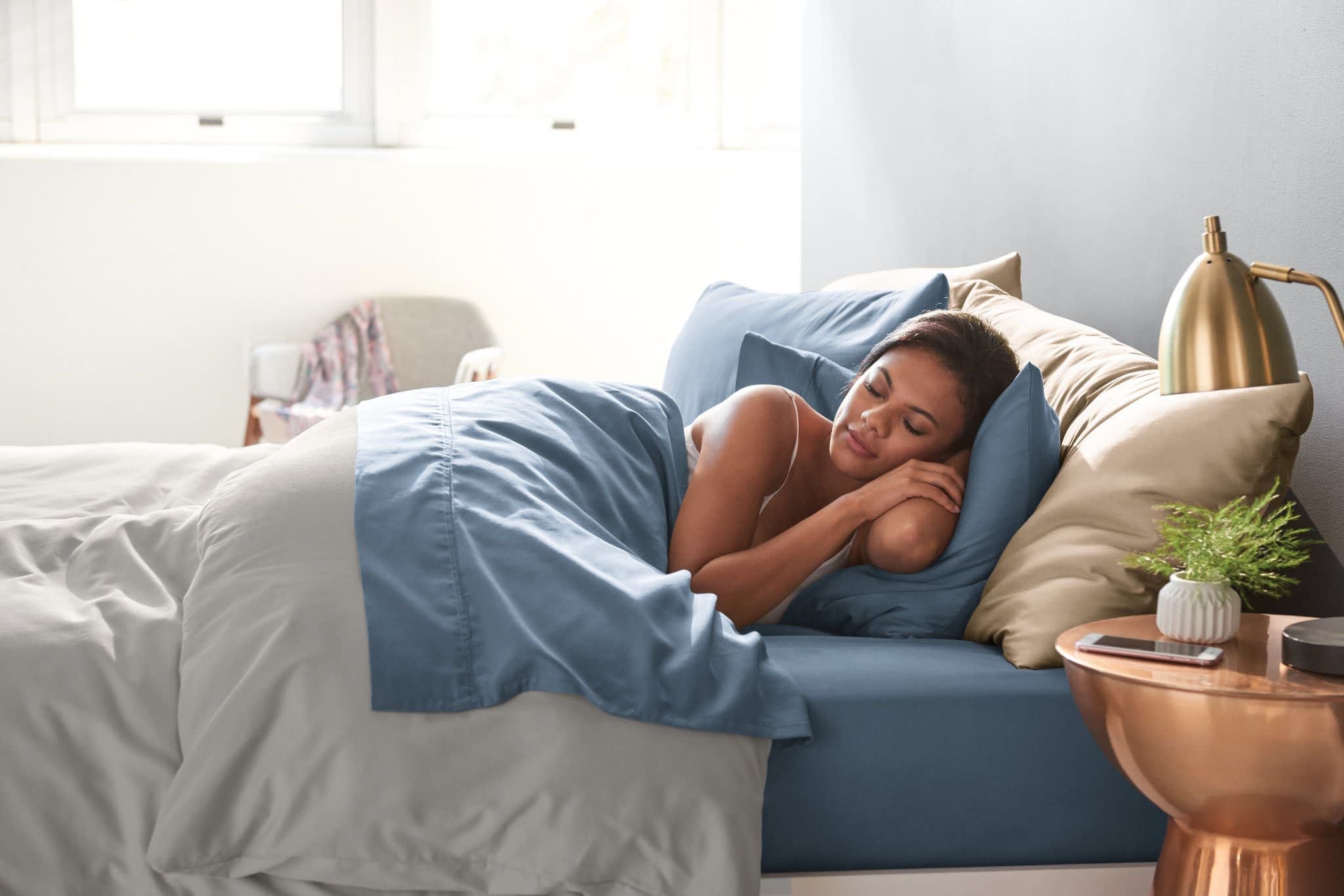
Here are therapist-approved tips to help you get better sleep when you have anxiety.
If you've ever gnawed on a problem when you were supposed to be sleeping, you know that a racing mind and worrywart thinking don't make good bedfellows.
Now, imagine experiencing that most or all the time. That's what it's like trying to sleep when you have anxiety.
As the body's natural response to stress, anxiety can make you feel worried or fearful about things that are about to happen (or may happen). Outside factors can exacerbate it: The Centers for Disease Control and Prevention (CDC) reported that 31% of U.S. adults struggled with anxiety during the height of the pandemic.
While having occasional anxiety is perfectly normal, people who have anxiety disorders frequently experience worries that are not proportional to the situation and interfere with everyday activities — like sleeping.
What Is Anxiety and How Does It Affect Sleep?
“Anxiety is the overestimation of threat and the underestimation of your ability to cope with those things," says Christina Pierpaoli Parker, Ph.D., an expert in women's behavioral sleep medicine.
People with anxiety can struggle to get high-quality sleep because they tend to be on high alert.
"[Anxious people] are predisposed to psychophysiological arousal. In other words, their nervous system is much more sensitive and active than the average person," Parker says.
What Are Sleep Anxiety Symptoms?
Anxiety can interfere with sleep physiologically or physically and can eventually cause mental distress.
“When we are anxious, our fight or flight, or freeze nervous system; that sympathetic nervous system is activated. And what happens when that system gets activated is this initiation and cascade of stress hormones that elicit physiological experiences of anxiety, including palpitations, tachycardia, feeling hot, or feeling cold, tension, these physiological symptoms alone can make falling or staying asleep quite difficult," Parker says.
For example, thoughts can spiral. You might think "if I don't get eight hours of sleep, I won't be able to function." Some people struggle with thoughts of "if I fall asleep, I won't be able to wake up again."
If anxious or ruminating thoughts keep you from sleeping well at night, here are 8 therapist-approved tips:
1. WRITE IN A JOURNAL
Journaling an hour or two before bed helps you solve problems on paper or rethink them in a new way to help with their solutions.
“Anxiety happens when we are nervous, worrisome or apprehensive about a situation," says Sasha Jackson, MSW, LCSW, a therapist in San Joaquin Valley, California. “Writing how you can solve the problem or fix it before you go to bed can help ease doubts you have."
In fact, journaling in general, not just before bed, has been shown to help worries seem less worrisome overall. Check out 6 journal styles to try for physical and emotional wellness.
2. DEEP BREATHING FOR BETTER SLEEP
Once you recognize that you're feeling anxious and you are aware of that, try to find ways to remind yourself that everything is OK.
If you find yourself ruminating before bedtime, take several deep breaths, says Christina Pierpaoli Parker, Ph.D., an expert in women's behavioral sleep medicine.
“When we deep breathe, we give our body a sign that it's physically safe, and that there was a false alarm. We don't need to fight, flight or freeze," she says.
Any activity that can help you manage mental stress — like meditation or guided imagery — can also help you stay grounded.
3. CREATE A NIGHTLY SLEEP RITUAL
Follow a bedtime routine that works for you: A bath, skincare routine, soft music, journaling, yoga — whatever your pre-bed routine is, it helps you wind down for sleep and signals your brain that it's time.
To start, Parker suggests turning down the lights and limiting your time with blue light emitting devices (or use blue light blocking glasses).
Do something that's relaxing but not overly stimulating. Read a book, fold laundry, watch a light-hearted TV show or take a warm bath or shower.
4. SLEEP TIGHT WITH A WEIGHTED BLANKET
Research shows that the calming effect of the deep pressure stimulation from a weighted blanket increases relaxation, relieves stress and helps you fall asleep and stay asleep. In short: A weighted blanket improves sleep quality overall.
The Sleep Number® True Temp™ weighted blanket with its quilted outer cover also continuously regulates your temperature while you sleep, attracting and removing moisture to prevent overheating.
5. TIRE YOURSELF OUT WITH EXERCISE
Exercising — although not too close to bedtime since that can rev you up — during the day can help you burn off excess energy and drift off faster at night.
"Implementing movement into your daily routine is going to help build up that hunger for sleep later," says Parker. "But it's also going to help kind of regulate some of the nervous energy that people might otherwise carry."
6. CREATE A COMFORTABLE, COZY SLEEPING SPACE
Your bedroom should be dark, free of distractions, kept at a cool sleep temperature, and ideally only be used for sleeping or sex — not studying, watching TV or working. Use a white noise sound machine to create a soothing atmosphere.
“Ensure that you have a non-stimulating environment to rest in," says Nina.
You can use the Sleep Number® app to figure out how you can improve your environment and sleep habits.
Another free tool with helpful step-by-step tips is the free Sleep30® Challenge, shown to help improve participants' sleep quality and reduce poor sleep habits.

7. SEPARATE YOUR WORK AND SLEEP SPACES
Nina says it's important to avoid resting near your workspace or next to unfinished projects.
The problem is that the spillover effect from unfinished work can creep into your thoughts while you are trying to sleep, and if the work is logistically nearby, it can be even more challenging.
“If it is not possible to physically distance, cover it up with a blanket and repeat an affirmation that you will no longer be worrying about that until the next morning," she says.
8. IF ALL ELSE FAILS: EMBRACE ANXIOUS ENERGY
Sleep is elusive at times. Instead of fighting your restlessness, go with it.
“Sometimes it can help to embrace your anxious energy, meaning get out of bed and do something," says Sultanoff.
Keep a list of can't-sleep tasks like sorting papers, cleaning out a drawer, reading or writing a letter to someone — small tasks you only do when you can't sleep — until you feel tired enough to fall back asleep.
Sometimes sleeping with anxiety can be tricky and involve more than just good sleep hygiene (going to bed at the same time nightly, limiting caffeine and alcohol after noon and sleeping on your Sleep Number smart bed). If anxiety is keeping you awake, talk to your doctor or therapist about more ideas that may help.
Like diet and exercise, quality sleep is essential for optimal wellbeing and performance. Because everyone's sleep needs are different, Sleep Number® smart beds sense your movements and automatically adjust firmness, comfort and support to keep you both sleeping comfortably. Find your Sleep Number® setting for your best possible night's sleep.